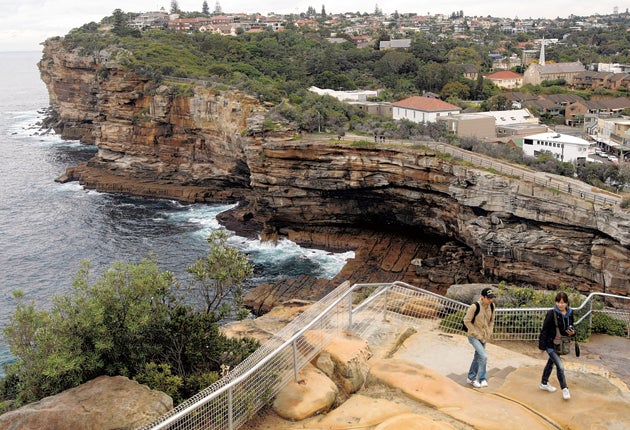Don Ritchie, 84, the unlikely angel at Australia's gate
For years, one man has tried to save the tortured souls who come to kill themselves near his home

Your support helps us to tell the story
From reproductive rights to climate change to Big Tech, The Independent is on the ground when the story is developing. Whether it's investigating the financials of Elon Musk's pro-Trump PAC or producing our latest documentary, 'The A Word', which shines a light on the American women fighting for reproductive rights, we know how important it is to parse out the facts from the messaging.
At such a critical moment in US history, we need reporters on the ground. Your donation allows us to keep sending journalists to speak to both sides of the story.
The Independent is trusted by Americans across the entire political spectrum. And unlike many other quality news outlets, we choose not to lock Americans out of our reporting and analysis with paywalls. We believe quality journalism should be available to everyone, paid for by those who can afford it.
Your support makes all the difference.Don Ritchie's house overlooks the gateway to Australia: the tall sandstone cliffs that guard the entrance to Sydney harbour. It is a hauntingly beautiful spot – and a tragic one. Every year, an estimated 50 people throw themselves on to the rocks below. That figure would be higher were it not for Mr Ritchie, who over the past 40 or so years has coaxed hundreds of tortured souls back from the brink. Now 84, he is the self-appointed patrolman of the Gap, as the cliffs are known – and, to some, a guardian angel.
Through the picture window in his living-room, Mr Ritchie has a bird's eye view of the cliff-top, which attracts a steady flow of tourists and joggers. If he sees someone lingering a little too long, he crosses the road and offers them a cup of tea. Over the years, many have followed him home. Others have not – but his kind words would have been the last thing they heard.
In his younger days, he would scale the fence and sometimes physically drag people to safety. Once a woman nearly hauled him over the edge with her. Why does he do it? "I'm just trying to save a life," he says. "I used to sell kitchen scales and bacon cutters, then I was state manager of a life insurance company. At the Gap, I'm trying to sell people life."
Yet still they come: the desperate, the depressed and the mentally disturbed. The local council has embarked on a suicide prevention plan, involving taller fences, emergency telephones, CCTV cameras and signs bearing messages of hope. However, it needs $2.1m (£1.26m) to complete it, and the federal government has twice rejected its request for funding.
Seated in his green leather armchair, where he spends his days reading and scanning the scene outside, Mr Ritchie recalls some notable successes and failures.
"I got up one morning at about 7am, opened the blinds and saw a lady standing right opposite my window. I quickly got dressed and went over. She had already put her handbag and shoes outside the fence, which is pretty common. They very often leave something behind – sometimes it's a note, but generally a piece of clothing. I said to her: 'Why don't you come over and have a cup of tea?' She came with me, and Moya [his wife] made her breakfast. When she got home, she rang to say she was feeling much better. Two or three months later, she walked up the garden path with a magnum of French champagne."
On another occasion, Mr Ritchie – who was awarded a bravery medal in 1970 and an Order of Australia medal in 2006 – saw a man on crutches gazing out to sea. "When I got there, he was gone. Only his crutches were left."
Most poignantly, perhaps, he remembers trying to talk a 19-year-old out of killing himself. As he stood beside him, the young man jumped; his hat flew off, and the wind blew it into Mr Ritchie's hand. "It turned out that as a little boy he had lived in the block of flats just behind our house, and he used to play with our grandkids." How did he feel? He removes his glasses and rubs his eyes. "It's just another case."
The cliffs – where Australians have been committing suicide since at least 1863, when a local woman, Anne Harrison, leapt to her death – seem to exert a draw on those in despair. A man in Western Australia recently wrote a suicide note, then drove across the continent to kill himself at the Gap. Within one 10-day period last month, four people leapt to their deaths. Originally, the Ritchies bought their house for the view. A former navy seaman, Mr Ritchie loves watching ships and boats. Is he haunted by the people he could not save? He turns his palms upwards. "You can't do much about it."
Dianne Gaddin, whose daughter, Tracy, killed herself at the Gap in 2005, is full of admiration. "It takes an enormous amount of courage just to go up to a person who is going to jump. Most people don't really want to die, they just can't cope with living, and it would just take a little word from somebody to stop them. Don has a charisma about him, that I think makes people feel safe and secure and calm."
Years ago, a painting depicting a group of ethereal white figures bathed in sunlight was posted anonymously into the couple's letterbox. A message on it says: "Thank you. You are truly an angel that walks among us." The painting – which the Ritchies believe represents the people he has saved – hangs on their living-room wall.
Join our commenting forum
Join thought-provoking conversations, follow other Independent readers and see their replies
Comments